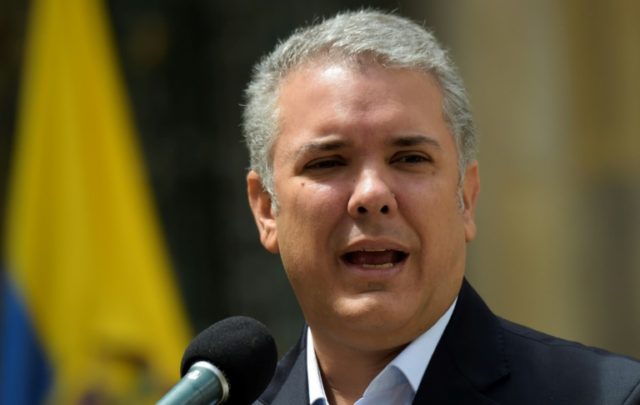Colombia’s conservative president Iván Duque made his first address to the United Nations General Assembly on Wednesday, demanding global intervention to stop the socialist dictatorship in Venezuela from “annihilating the freedoms” of its people.
Colombia shares an extensive border with Venezuela and, according to Duque, has taken in nearly one million refugees in the past two years, most fleeing starvation, a total lack of functional healthcare, and state violence against anyone who publicly complains about the situation.
The U.N. lists Venezuelan dictator Nicolás Maduro as scheduled to address the forum Wednesday afternoon, though he appeared to still be in Caracas on Tuesday night.
“Our country is facing a great challenge,” Duque told the assembly. “The challenge we face is [in the form of] millions of fearful faces, with cold in their bones, hunger in their stomachs, and the agony of their nation. It is a challenge that is currently, right at this moment, walking with uncertainty down the highways of Colombia.”
“This challenge is our Venezuelan brothers fleeing dictatorship,” he continued. “Many of them are innocent children, unprotected and exposed to the tragedy of uprooting.”
Duque noted the outsized number of Venezuelan refugees crossing into Colombia, comparing the situation to the Syrian refugee crisis triggered by the civil war in that country. “While the conflict in Syria has generated a flow of 600,000 refugees a year to Turkey in a period of six years, Colombia … has opened its doors to almost one million Venezuelans in nearly two years.”
According to U.N. numbers, more Venezuelans are crossing into Colombia than African migrants attempting to enter Italy. Colombia’s government is so concerned with the number of refugees entering the country – many of them diseased and close to starvation – that it sent senior officials to Turkey last year to study the construction and maintenance of refugee camps in that country.
“We have welcomed them with affection and we always well … but we cannot fail to call things by their name,” he continued, condemning the regime of socialist Nicolás Maduro as “a dictatorship that annihilated freedom.”
“We are living the most outrageous migratory and humanitarian crisis in the recent history of the region because of a dictatorship that annihilated freedom. The free determination of peoples cannot be manipulated and turned into the free determination of oppressors,” Duque asserted. “The international community must demand the immediate freedom of political prisoners and identify the best solutions to this crisis.”
Colombia has struggled with maintaining a civil bilateral relationship with Venezuela. Maduro’s dictatorship has threatened to bomb Colombia in the past while accusing Bogotá of planning or helping the United States to plan a military invasion. That has not stopped Duque from pursuing support from Washington. Duque met with President Donald Trump, Vice President Mike Pence, and other senior officials on Tuesday to discuss both the Venezuelan crisis and the growing drug trafficking problem in the region. Trump referred to Duque as “a great friend of the United States” and expressed eagerness to get to work combatting crime in Colombia.
Trump made his opposition to the Venezuelan dictatorship and its socialist ideology a core of his address to the U.N. on Tuesday.
“Not long ago, Venezuela was one of the richest countries on Earth. Today, socialism has bankrupted the oil-rich nation and driven its people into abject poverty,” Trump told the Assembly. “Virtually everywhere socialism or communism has been tried, it has produced suffering, corruption, and decay. Socialism’s thirst for power leads to expansion, incursion, and oppression. All nations of the world should resist socialism and the misery that it brings to everyone.”
Duque did not mention socialism in his remarks on Venezuela.
On Wednesday, Trump suggested Washington had not eliminated the possibility of a military invasion to end repression in Venezuela.
JUST IN: President Trump at the UN on pressuring Venezuela and President Maduro:
“All options are on the table. Every one. The strong ones, and the less than strong ones. Every option — and you know what I mean by strong.” pic.twitter.com/FikCAqqViz
— NBC News (@NBCNews) September 26, 2018
Duque also addressed the situation in Colombia, where years of negotiations with the Marxist Revolutionary Armed Forces of Colombia (FARC) terrorist group have resulted in the largest coca leaf crops since the United Nations began tracking those statistics. The FARC generates millions in cocaine trafficking, and much of the drug ends up in the United States or elsewhere around the world. Duque won the presidency this year in large part because he promised a strong hand against drug traffickers.
Duque told the audience that his government would commit to helping terrorists who choose to give up their weapons – a particularly important promise given how many FARC members are former child soldiers kidnapped into terrorism at an early age – but that, “just as we will meet the needs of those who yield to legal norms, we must also apply the law to those who persist on the path of criminality.”
“Those who mock the victims and the generosity of the Colombian people will face the full brunt of the law,” Duque vowed.

COMMENTS
Please let us know if you're having issues with commenting.